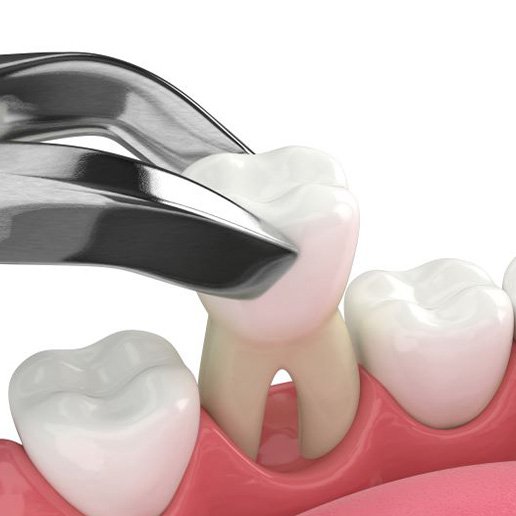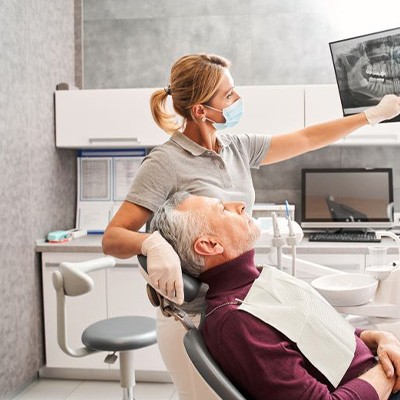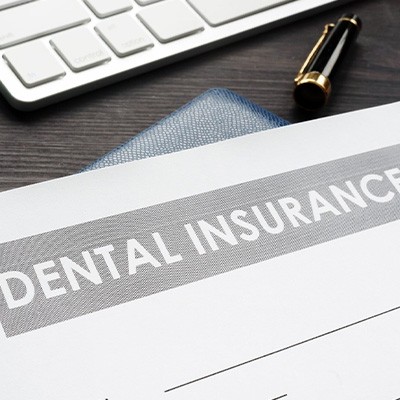Tooth Extractions – Merrillville, IN
Safe Removal of Your At-Risk Teeth
While dentistry can often save damaged teeth, sometimes that just isn’t possible. A person’s tooth may be too worn or broken for salvage to work. Our practice suggests removal in those cases, as it minimizes the risk and harm to your smile. These tooth extractions in Merrillville preserve a patient’s oral health and keep it from getting worse. To learn more about them, please keep reading or schedule a visit to our office soon.
Reasons Why Tooth Extractions Are Necessary

Our office never takes tooth extraction lightly. This treatment is a last resort – something we do when there's no other option. Drs. David and Kenneth Fried would rather save your teeth with restorative treatments like dental crowns, tooth-colored fillings, etc. That way, your natural tooth can keep working as the ideal tool for biting, chewing, and smiling.
Given these facts, we only perform tooth extractions in dire cases. We’ll suggest one if you suffer from one (or more) of the following:
- A tooth with an inoperable cavity
- Loss of the bone needed to support a tooth
- Broken teeth that can’t be put back together
- A rapidly-spreading tooth infection
The Process of Removing a Tooth

We’ll assess your tooth at your consultation to see how (or if) we should extract it. Based on our findings, we’ll confirm whether the removal will be simple or complex.
If the affected tooth is visible, our team will perform a simple extraction. This type goes smoothly once we numb the treatment site. In particular, it uses dental forceps to rock your tooth back and forth until it separates from your gums.
We’ll perform a complex extraction instead if the tooth hasn’t (fully) erupted. In that case, we’ll make an incision in your gums after we’ve numbed your mouth. Our team will then divide and extract the tooth into sections to reduce bone loss. From there, we’ll sew up the incision.
After either kind of extraction, our dentists will plan how to replace your missing tooth. Getting a new one would ensure you don’t suffer long-term tooth loss.
Tooth Extraction Aftercare

Since adult teeth should be permanent, your mouth must recover from the extraction process. Your treatment site will likely feel sore and achy during this healing period. That said, you can minimize these effects with the following aftercare tips:
- Twenty-four hours after the extraction, clean the treatment site with a saltwater rinse.
- Please don’t drink from a straw; its suction can dislodge your blood clot.
- Avoid delays in recovery by not smoking or spitting right after treatment.
- To manage any post-treatment aches, use store-bought pain relievers.
- Don’t chew near the extraction site while it heals.
By using the tricks above, you should heal from care nicely. You can then look into a number of tooth replacement options; a prosthetic would restore your smile, strengthen your bite, and more.
Understanding the Cost of Tooth Extractions

Tooth extractions tend to be one of the lower-cost restorative services. However, their price can vary based on a number of factors. When you come in for your consultation, we will consider the details of your case before providing an estimate. We can also help you understand your payment options. For example, we welcome dental insurance, and we accept third-party financing through CareCredit. Truly, tooth extractions can be an affordable step on your way to improved oral health!
Factors That Can Affect Tooth Extraction Cost

Some factors that can have a bearing on the cost of your extraction procedure include:
- The specific tooth that requires removal. Some teeth, due to their location and structure, are easier to remove than others, and that is generally reflected in the fees we charge.
- The number of teeth that must be extracted. Logically, it costs less to remove one tooth than several. (Although it is generally more economical to get several teeth removed at once than at separate times.)
- The complexity of your case. Surgical extractions, where we need to make incisions in the gums or break a tooth into pieces, tend to come with higher fees than simple extractions.
- Additional care. After most extractions, tooth replacement is extremely important. Although this is a separate cost from the extractions themselves, it should still be accounted for in your budget. Our team can help you understand the cost of dental implants, bridges, and dentures.
Does Dental Insurance Cover Tooth Extractions?

In most cases, yes, dental insurance does apply to tooth extractions. Simple extractions are often classified as a basic procedure, so up to 80% of their cost might be covered. Surgical extractions might be 50% covered since they tend to be categorized as a major service. Our team welcomes insurance, and we are in-network with several popular PPO plans. You can count on us to help you understand how your benefits apply and use them to your greatest financial benefit.
Other Options for Making Tooth Extractions Affordable

Outside of insurance, another useful provision that may help you manage the cost of your care is financing through CareCredit. CareCredit is a third-party company that specializes in providing low-interest and no-interest payment plans for dental and medical services. The application process is fast, and after you are approved, you may be able to choose a monthly payment amount that works with your budget. The majority of patients are approved for credit within minutes of submitting their application.
Are you interested in learning more about tooth extractions and their cost? We would be happy to answer your questions. Contact us today to speak to our friendly Merrillville team and request a consultation.
Tooth Extractions FAQs
Does It Hurt to Have a Tooth Extracted?
Many patients with dental anxiety are so afraid of sitting in the dentist’s chair that they avoid scheduling their appointments, especially if it involves a major procedure, like a tooth extraction. If you’re worried that it will be a long and agonizing process, you can safely set your concerns aside!
First, our team numbs the area with a local anesthetic so that you might feel some pressure while we work, but not discomfort. In extreme cases that require surgical extractions, you will also be sedated.
Then, it’s normal to have some associated aches as the meds wear off afterward. These symptoms typically last a few days and then start to subside. It’s usually safe to take over-the-counter meds like Tylenol or ibuprofen until they fade completely.
Is There an Alternative Treatment for Tooth Extractions?
It’s natural to wonder if there are other more conservative options to address your oral issue than having a troublesome tooth removed. For example, some toothaches can be alleviated with a root canal before you’re fitted with a dental crown to restore your grin’s appearance and functionality.
However, sometimes teeth are too decayed or damaged to be treated or repaired effectively and put your oral health at risk. Although we prefer to protect and preserve your natural teeth, we might recommend a removal as a last resort to save your smile.
What Should I Expect from Tooth Extraction Recovery?
After your procedure, your mouth must form a blood clot over the recently exposed nerves and bone tissue to prevent a painful complication known as dry socket. We’ll provide you with a list of post-op instructions for you to follow that keep in intact while you heal. We usually ask that you:
- Avoid drinking with straws. You need plenty of water to boost your immune system and rinse germs out of your mouth but sucking through a straw can dislodge your blood clot. Try sipping directly from a cup instead.
- Get lots of rest. You should avoid strenuous activities that elevate your heartrate or blood pressure. Also, elevate your head at night to keep blood from pooling, which can cause painful pressure in your empty socket.
- Keep your mouth clean. But avoid brushing in the first 24 hours. Rinse gently with salt water to naturally disinfect your mouth until it’s safe to resume your daily dental hygiene routine.
- Don’t smoke. Cigarettes and vapes contain nicotine which is vasoconstrictor. If your blood doesn’t have enough oxygen, your body can’t deliver essential infection-fighting cells and other nutrients to your mouth to prevent gum disease and other issues.
- Address aches. You can apply a cold compress or take over-the-counter medications to alleviate associated throbbing or inflammation.
- Eat soft foods. To avoid irritating your already tender gums, stick to soft meals like yogurt, applesauce, mashed potatoes, or scrambled eggs.
What Are My Options to Replace My Missing Tooth?
You might feel tempted to leave the empty space in your smile, especially if it’s in the back of your mouth where no one can easily see it. However, your remaining teeth are likely to drift out of alignment to close the gap, which can wear down your enamel prematurely and increase your vulnerability to tooth decay, gum disease, or injuries.
Fortunately, our dentists at United Dental Centers of Merrillville offer multiple ways to replace missing teeth, including:
- Dentures. These are the tried-and-true solution for tooth loss and can be adapted to meet your unique needs.
- Dental bridges. This oral appliance is ideal for those missing one or several teeth in a row. They include a dental crown on each side that anchors to healthy teeth or implants to bridge the space in your smile.
- Dental implants. These restorations are the only ones that are surgically placed in your jawbone to keep it active and healthy.
